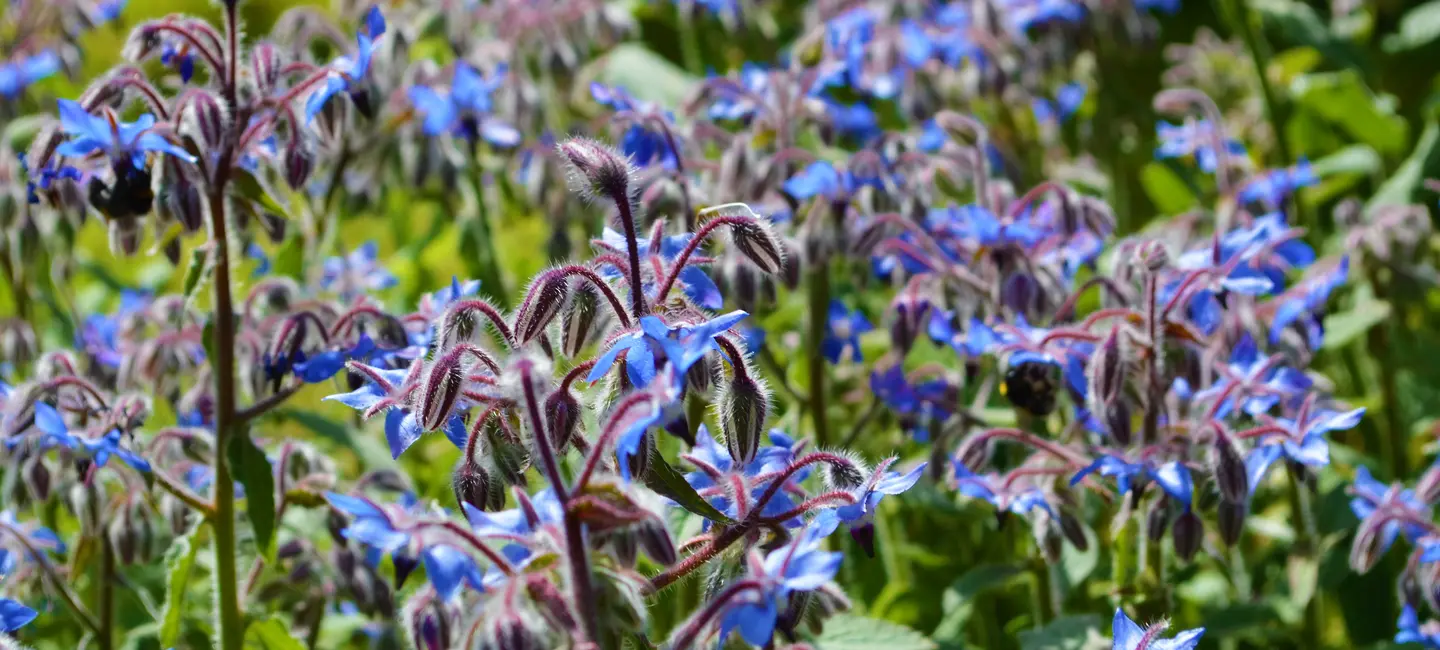
Borage (Borago officinalis) is an herb. Borage seed oil contains a fatty acid called gamma-linolenic acid, which seems to have anti-inflammatory effects.
Borage is native to the Middle East, Mediterranean, and North Africa. Borage plant parts other than the seed oil can contain dangerous chemicals called pyrrolizidine alkaloids (PAs). Borage seed oil doesn't contain this chemical.
People use borage seed oil for many conditions, including eczema, rheumatoid arthritis (RA), diabetes, and infant development, but there is no good scientific evidence to support most of these uses.
Is It Effective?
NatMed Pro rates effectiveness based on scientific evidence according to the following scale: Effective, Likely Effective, Possibly Effective, Possibly Ineffective, Likely Ineffective, Ineffective, and Insufficient Evidence to Rate.
- Eczema (atopic dermatitis). Taking borage seed oil by mouth does not seem to improve symptoms of eczema in adults or children.
There is interest in using borage for a number of other purposes, but there isn't enough reliable information to say whether it might be helpful.
Is it Safe?
When taken by mouth: Borage seed oil is possibly safe when used for up to 12 weeks. Other parts of the borage plant, such as the flower, leaf, and seed, may be unsafe. These parts of the plant can contain dangerous chemicals called pyrrolizidine alkaloids (PAs). PAs can damage the liver or cause cancer, especially when used in high doses or for a long time. Only use products that are certified and labeled as PA-free.
When applied to the skin: Borage seed oil is possibly safe.
Special Precautions & Warnings:
Pregnancy and breast-feeding: Borage products containing dangerous chemicals called pyrrolizidine alkaloids (PAs) are likely unsafe during pregnancy and while breast-feeding. These chemicals can cause serious liver disease and might cause cancer. PAs might also cause birth defects and can pass into breast milk. It is important to avoid borage products that might contain PAs. Only use products that are certified and labeled as PA-free.
Children: Borage seed oil is possibly safe when taken by mouth. Borage products that contain PAs are likely unsafe when taken by mouth. Only use products that are certified and labeled as PA-free.
Bleeding disorders: Borage seed oil might prolong bleeding time and increase the risk of bruising and bleeding. If you have a bleeding disorder, use borage with caution.
Liver disease: Borage products containing pyrrolizidine alkaloids (PA) might make liver disease worse. Borage seed oil doesn't contain these chemicals. But other parts of the plant, like the leaf, flower, and seed, can contain PAs. Only use products that are certified and labeled as PA-free.
Surgery: Borage seed oil might increase the risk of bleeding during and after surgery. Stop taking borage seed oil at least 2 weeks before a scheduled surgery.
Medications that increase the breakdown of other medications by the liver (Cytochrome P450 3A4 (CYP3A4) inducers)
Interaction Rating=Moderate Be cautious with this combination.
Borage is changed and broken down by the liver. Some drugs increase how quickly the liver changes and breaks down borage. This could change the effects and side effects of borage.
Medications that slow blood clotting (Anticoagulant / Antiplatelet drugs)
Interaction Rating=Moderate Be cautious with this combination.
Borage seed oil might slow blood clotting. Taking borage seed oil along with medications that also slow blood clotting might increase the risk of bruising and bleeding.
Phenothiazines
Interaction Rating=Moderate Be cautious with this combination.
Taking supplements containing gamma-linolenic acid, such as borage seed oil, with phenothiazines might increase the risk for a seizure in some people.
Herbs and supplements that might slow clotting: Borage seed oil might slow blood clotting and increase the risk of bleeding. Taking it with other supplements with similar effects might increase the risk of bleeding in some people. Examples of supplements with this effect include garlic, ginger, ginkgo, nattokinase, and Panax ginseng.
Pyrrolizidine alkaloids (PAs)-containing herbs and supplements: Borage contains PAs, dangerous chemicals that can harm the liver. Don't use borage with any other herb that might also contain pyrrolizidine alkaloids (PAs). This could significantly increase the risk of developing serious liver disease. Examples of supplements potentially containing PAs include alkanna, boneset, borage, butterbur, and coltsfoot.
There are no known interactions with foods.
Borage seed oil has most often been used by adults in doses of 2-3 grams by mouth daily for 10-24 weeks. Speak with a healthcare provider to find out what dose might be best for a specific condition.
Bee Plant, Beebread, Borage Flower, Borage Leaf, Borage Oil, Borage Seed Oil, Borago, Borago officinalis, Borraja, Bourrache, Bourrache Commune, Burage, Burrage, Common Borage, Common Bugloss, Cool Tankard, Feuille de Bourrache, Fleur de Bourrache, Huile de Bourrache, Huile de Graines de Bourrache, Langue de Bœuf, Ox's Tongue, Pain-des-Abeilles, Starflower, Starflower Oil, Talewort.
Information on this website is for informational use only and is not intended to replace professional medical advice, diagnosis, or treatment. While evidence-based, it is not guaranteed to be error-free and is not intended to meet any particular user’s needs or requirements or to cover all possible uses, safety concerns, interactions, outcomes, or adverse effects. Always check with your doctor or other medical professional before making healthcare decisions (including taking any medication) and do not delay or disregard seeking medical advice or treatment based on any information displayed on this website.
© TRC Healthcare 2024. All rights reserved. Use and/or distribution is permitted only pursuant to a valid license or other permission from TRC Healthcare.
